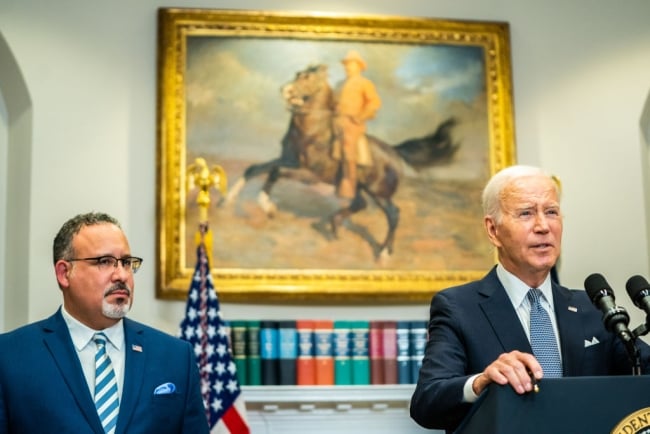You have /5 articles left.
Sign up for a free account or log in.

Colleges and universities are calling on the Education Department to delay the reporting requirements in the gainful employment rule that is set to take effect this summer.
Demetrius Freeman/The Washington Post/Getty Images
As colleges and universities scramble to process student financial aid applications and send out award letters, institutions want more time to comply with reporting requirements in the Education Department's new gainful employment and financial value transparency rule.
The rule aims to provide prospective students with more information about whether college programs pay off. The department will calculate whether graduates of programs can afford their yearly debt payments and whether they make more than an adult in their state who didn’t go to college—and then publish the results. Programs at for-profit colleges, as well as nondegree programs in any sector, could lose access to federal financial aid if they fail either of those tests. When others fail, the department will inform students and families that those academic offerings could lead to adverse financial consequences.
In order to provide that information to families, the department is requiring all colleges and universities to report more program-level information, including the total cost of attendance and the amount of private education loans disbursed to students. Institutions will need to submit two years’ worth of data by July 31 unless the department opts to push back the deadline.
A delay is what college administrators and their representatives in Washington, D.C., say they need. Institutions have too little information at this point about how to comply with the reporting requirements, they say, and their staffs are already stretched thin from dealing with the new Free Application for Federal Student Aid (FASFA), whose launch has been plagued by technical issues and delays.
A bipartisan group of senators echoed those concerns last week in a letter to the department. “Giving institutions more time to complete this reporting will have no negative impact on students and families in terms of institutional accountability or transparency, but will certainly benefit them by having financial aid administrators focused in these upcoming months on getting their financial aid in order,” the senators wrote.
The Education Department did not respond to a request for comment Tuesday.
Rachel Fishman, director of higher education policy at New America, a left-leaning think tank, said that she understands the calls for pushing back the deadline. Sending students their financial packages is “an absolute priority with major consequences on student access,” she said. But while she understands the calls for a delay, she said “fully implementing [gainful employment] is absolutely crucial for student success—and the department must ensure that students are protected from low-value programs as soon as possible.”
Even though colleges are supposed to report data by July 31, the department won’t start publishing it until next fall. The accountability measures don’t kick in until July 1, 2026.
Karen McCarthy, vice president of public policy and federal relations at the National Association for Student Financial Aid Administrators (NASFAA), said complying with the reporting requirements will be “a significant institutional undertaking." Furthermore, she said, a delay wouldn’t affect the rule’s timeline for implementation.
NASFAA first asked for a later deadline in December, along with other steps aimed at reducing the administrative burden on institutions. The request followed the Education Department’s announcement that it wouldn’t send students’ financial aid application information, or Institutional Student Information Records (ISIRs), to colleges until late January. (As it turned out, the department started sending ISIRs earlier this month.)
McCarthy said pushing back the gainful deadline and relaxing other requirements would allow the colleges to “clear the decks” and focus their energy on processing ISIRs to get aid offers to students as quickly as possible. The delays in the new FAFSA have further compressed the timeline for institutions in an already challenging admissions cycle.
“Schools are stressed and occupied by the FAFSA,” she said.
In mid-March, the American Council on Education (ACE) and 21 other higher education groups said in a letter to Education Secretary Miguel Cardona that pushing back the deadline back “is of the utmost importance.”
“Given the delays with the Free Application for Federal Student Aid (FAFSA) process, and the need for institutions to package student aid properly, we believe that the primary focus at this time should be ensuring the smoothest FAFSA process possible to help students best decide where to pursue their postsecondary education,” the organizations wrote.
The Education Department eased some requirements in February for colleges and universities to allow them to focus on the FAFSA. Emmanual Guillory, senior director of government relations at ACE, said he thinks the department will be also amenable to pushing back the reporting deadline. While ACE and its members have a number of concerns about the batch of regulations that will take effect July 1, Guillory’s hearing the most about the reporting deadline.
“For institutions, that’s where their mind is now,” he said. “Right now, institutions have to be preparing that data, but they don’t have the capacity.”
Colleges and universities also don’t know exactly what they need to report. The final rule and a notice posted on the Federal Register in February outline what data institutions should collect, but neither is sufficient, McCarthy said.
Because previous iterations of the gainful employment rule only applied to for-profit and nondegree programs, Guillory said, not all colleges have been keeping track of the appropriate data. Nearly 70 percent of college officials who responded to a recent survey about the new regulations said they were concerned about their institutions ability to comply with the final gainful employment rule, according to ACE.
McCarthy said that institutions need more specifics about how the department is defining the different reporting elements in order to build systems to gather and send the data to the department. When an earlier version of gainful took effect in July 2015, she noted, the department released a user guide in February of that year along with resources such as how to submit the data.
“We haven’t received any of that,” she said.
“Heavy Burden”
The department kicked off the process to implement the new rule in February with a notice on the Federal Register. The notice outlines the information it wants to collect under the regulations and is open for public comment until April 22. So far, nearly all of the 80 submitted comments call on the department to push back the deadline, citing the issues with FAFSA.
Amy Brumfield, director of institutional research at the College of Eastern Idaho, wrote that the reporting process “will place a heavy burden on our already strapped resources.” The college has two data analysts to handle the reporting, she said, along with a two-person financial aid office.
“Altogether, this reporting will take many hours of coordinated work across many departments, with no additional funding mechanism to cover that large project,” Brumfield wrote.
Other commenters said they were worried about turnover and burnout in their financial aid offices. This summer, they said, is not the time to mandate the reporting requirements.
Judy Cuellar, director of financial aid at Schreiner University in Texas, wrote that the department needs to “get it together.”
“You have to be kidding if you think schools are going to be able to provide this information by July 31 of this year,” Cuellar wrote. “There is no real definition of exactly what schools should be providing. This should have already been provided to schools. Not ‘it’s coming.’”
The department estimates that the first round of reporting, due this summer, will take about 5 million hours across 4,518 institutions. That’s one reason institutions have been urging the department to push back the deadline since it released the proposed rule last spring.
Agency officials rebuffed those initial calls. In the final rule issued last fall, officials wrote that the deadline was “reasonable and appropriate,” noting that institutions would have more than nine months to prepare. The department promised to provide guidance and training on the new requirements several months prior to the deadline. Now, with four months to go, colleges are still waiting for that assistance.
At the time, agency officials also brushed off concerns that the new FAFSA could complicate the ability of institutions to comply with the new rule.
“We note that the new FAFSA system and associated processes will become operational and available to institutions in December 2023,” the department wrote in the final rule—a prediction that didn’t come to pass.








